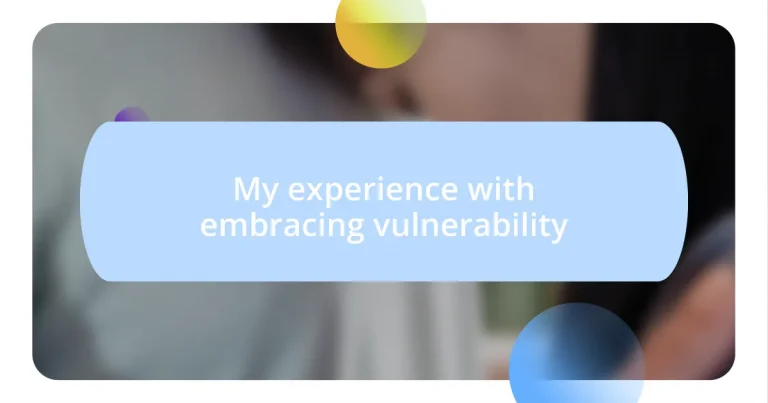Key takeaways:
- Embracing vulnerability fosters deeper connections and trust in relationships, promoting open discussions and support among friends and colleagues.
- Sharing personal struggles, like anxiety or self-doubt, can lead to growth and resilience, transforming challenges into opportunities for connection and creativity.
- Vulnerability serves as a catalyst for community building, as shared experiences create a sense of belonging and normalize discussions around mental health and personal challenges.
- Practicing vulnerability enhances emotional intelligence, cultivating empathy and understanding towards others’ struggles, ultimately enriching interpersonal relationships.
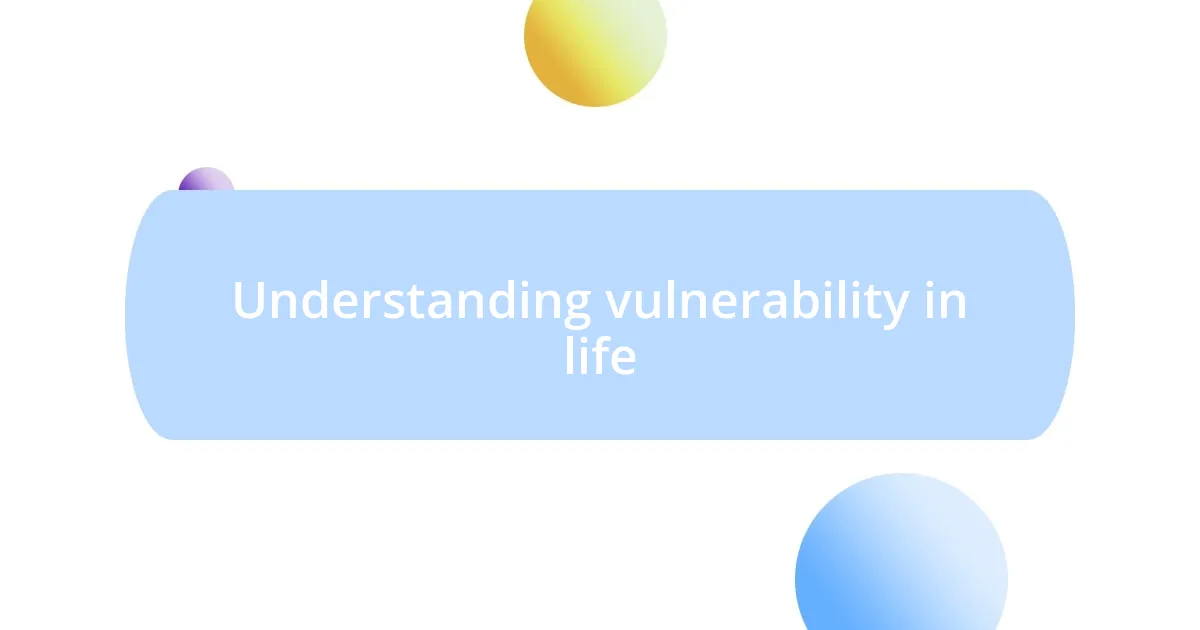
Understanding vulnerability in life
Vulnerability isn’t just a buzzword; it’s a raw, transformative part of our human experience. I remember a time when I had to share my deepest fears with a close friend. The fear of judgment loomed large, yet when I finally opened up, I was met with empathy rather than scorn. Isn’t it fascinating how confronting what scares us can lead to deeper connections?
Embracing vulnerability has taught me that it’s okay to feel exposed. There was a moment during a public speaking event when I felt my voice falter, my hands tremble, and I thought about abandoning the whole thing. But then I reminded myself that my imperfections made my story relatable. Why do we think showing weakness is a flaw when it can actually be a strength?
When we accept vulnerability, we invite authenticity into our lives. I once hesitated to share my passion for painting, fearing others would judge. Yet, when I finally showcased my work, I found many who resonated with my artistic journey. Have you ever held back something meaningful out of fear? I believe we often underestimate the power of sharing our true selves, not only for our growth but for those around us as well.
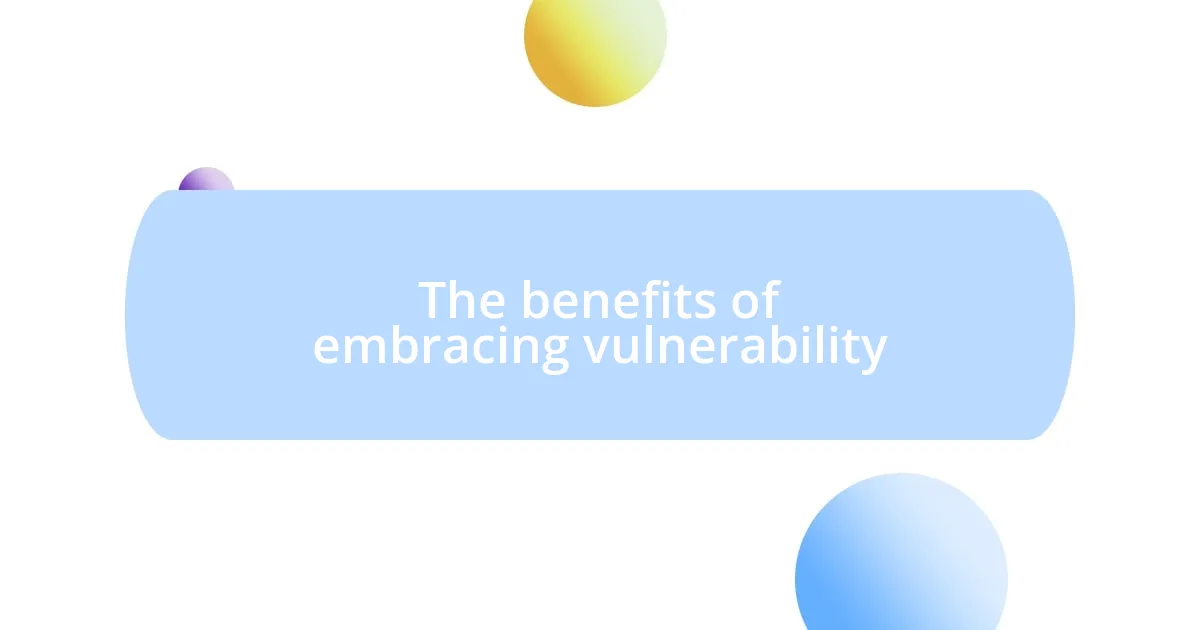
The benefits of embracing vulnerability
Embracing vulnerability has incredible benefits that can profoundly impact our lives. For me, one of the most surprising outcomes was the depth of trust it fostered in my relationships. I recall an instance when I decided to be open about my anxiety. The response from my friends was overwhelmingly positive, leading to more honest discussions about mental health, something we’d all avoided. It was a reminder that vulnerability can ignite authentic connections, bridging the gap between isolation and belonging.
Additionally, showing vulnerability can lead to personal growth and resilience. I often reflect on a challenging part of my life when I lost a job unexpectedly. Instead of hiding my feelings, I reached out to others, sharing my fears and uncertainties about the future. This openness not only helped me find support but also encouraged me to explore new opportunities I hadn’t considered before. Isn’t it empowering to realize that our struggles can serve as stepping stones to greater strength?
When we embrace vulnerability, we create a space for creativity and innovation to flourish. I once participated in a workshop where we were encouraged to share our imperfections openly. It was during that session that I discovered the beauty of collective sharing; our flaws became the springboard for new ideas. Have you ever experienced a moment when sharing your struggles brought about unexpected inspiration? I believe this is where true creativity blossoms, reminding us that our vulnerabilities can illuminate pathways to something extraordinary.
| Benefits | Personal Experience |
|---|---|
| Deeper connections | Sharing my anxiety opened doors to honest discussions in my friendships. |
| Personal growth | Being open about job loss led me to explore new opportunities. |
| Creativity and innovation | Participating in a workshop highlighted how imperfection can inspire collective creativity. |
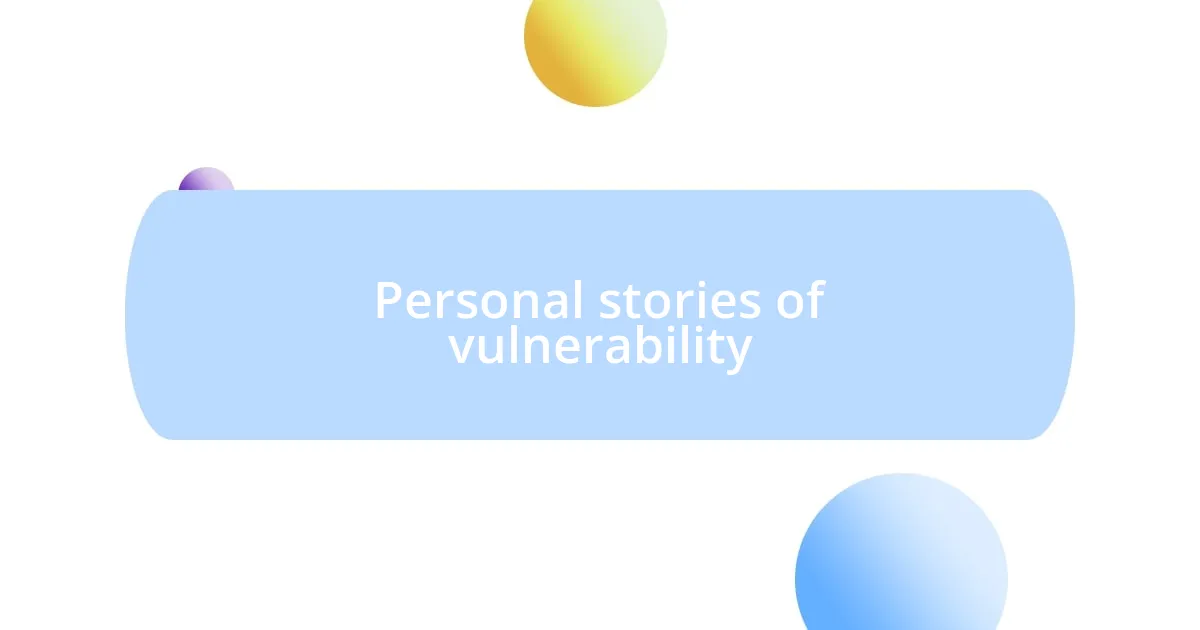
Personal stories of vulnerability
There was a time I hesitated before sharing my story of overcoming a difficult breakup. The thought of reliving the pain felt daunting, yet I knew that vulnerability could foster healing, both for me and others. When I finally opened up to my family during a dinner conversation, their understanding and support created an unexpected bond, each of us sharing our own stories of love and loss. Connecting through shared experiences brought comfort to what once felt like an isolating ordeal.
- Sharing pain can create bonds: Discussing my breakup allowed me to see how others had faced similar challenges.
- Encouragement breeds courage: Hearing my sister’s story about her own heartbreak inspired me to continue my journey of sharing.
- Community in vulnerability: Our tales interwove, creating a sense of belonging I didn’t know I needed.
I also recall the moment I decided to share my struggles with self-doubt while pursuing a new career path. In a small group of colleagues, I spoke about my fears of inadequacy. Instead of dismissing my feelings, they reciprocated with their own fears, breaking the ice for deeper connections. It was an eye-opening experience that taught me vulnerability could lead us to uncharted territories of camaraderie and bond us in ways I had never imagined.
- Acknowledging fear paves the way for connection: My open expression of vulnerability unlocked similar honesty from my colleagues.
- Mutual support bolsters confidence: Realizing we all face self-doubt helped me tackle my own uncertainties with renewed strength.
- Vulnerability as a catalyst for community: By sharing, our group transformed from acquaintances to a supportive network, united in our struggles.
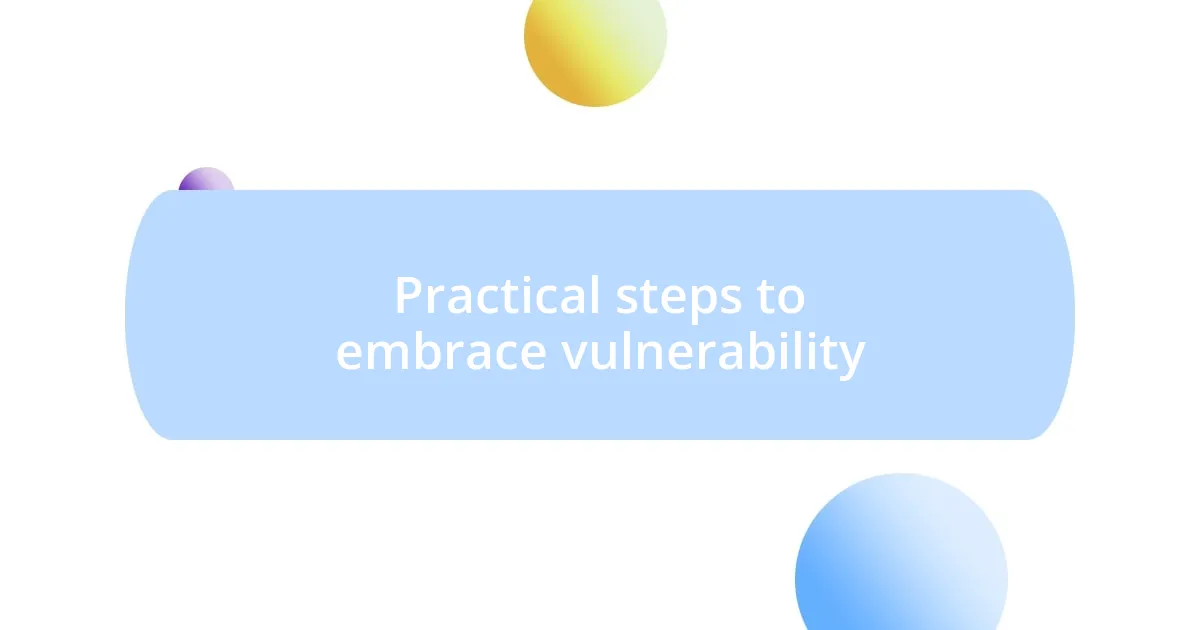
Practical steps to embrace vulnerability
Embracing vulnerability starts with acknowledging your feelings. I remember a moment when I felt overwhelmed by pressure at work. Instead of bottling it up, I shared my experience with my mentor. This small step shifted my perspective, reminding me that being open about my struggles can lead to guidance and support. Have you ever thought about how sharing a burden can lighten your load?
Another practical approach is to practice self-reflection. Journaling became a powerful tool for me, allowing me to voice secrets I had kept to myself for too long. By writing down my thoughts, I could confront my fears and insecurities in a safe space. This process not only unveiled hidden emotions but also helped me understand my patterns better. I encourage you to try it—what might you uncover about yourself?
Lastly, start by sharing small vulnerabilities in everyday conversations. I often test the waters by discussing less personal topics, like my challenges in organizing a family event. Over time, these small shares build trust and comfort for deeper discussions. It’s fascinating how a simple admission, like struggling with plans, can open up a dialogue about more significant life issues. What’s something minor you could share today that might pave the way for a richer connection?
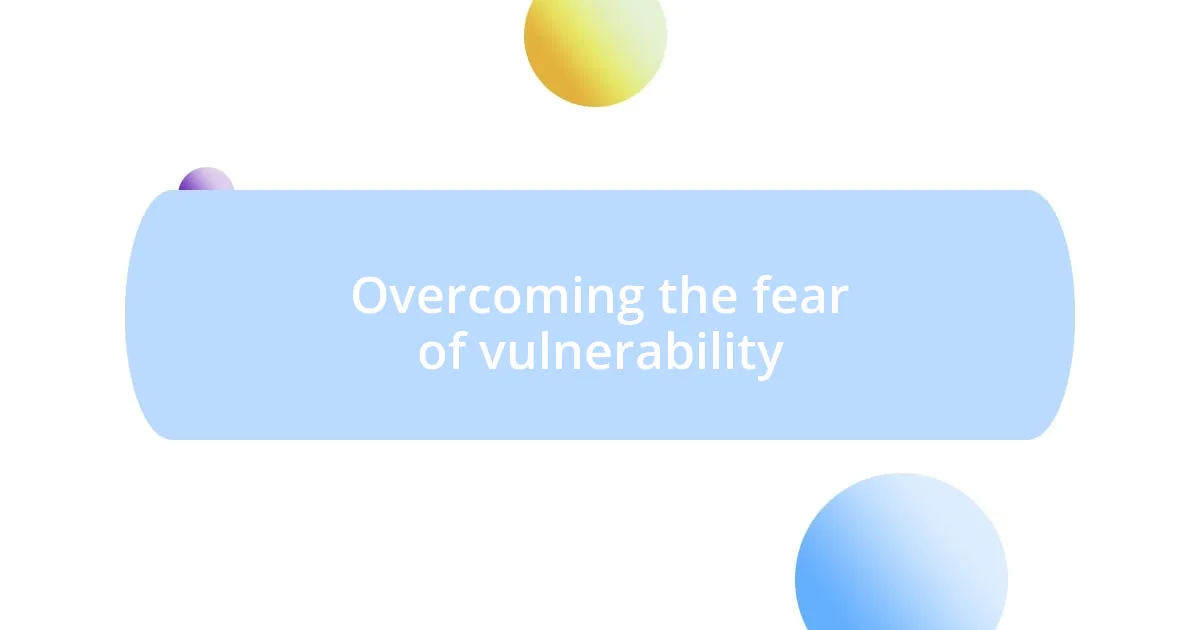
Overcoming the fear of vulnerability
Vulnerability can feel like standing on the edge of a cliff, peering into the unknown. I distinctly remember when I hesitated and ultimately chose to voice my struggles during a community workshop. I spoke about a time I felt utterly lost in my creative pursuits, fearing judgment from others. When I saw nods of understanding and support, I realized that sharing these fears cut through my anxiety, creating a space where we could all breathe a little easier. Have you ever wondered if others might feel the same way you do when you share your struggles?
A particularly effective way to overcome the fear of vulnerability is by redefining what vulnerability means to us. I learned that vulnerability doesn’t equal weakness; it’s an act of bravery. For instance, while preparing for a presentation, I revealed my nerves to my team instead of pretending to be confident. This moment not only humanized me in their eyes but also opened the floodgates for others to express their own apprehensions. In that moment, I felt an overwhelming wave of camaraderie, making me wonder—what if our fears could unite us instead of dividing us?
Sometimes, it’s essential to recognize that vulnerability is a skill that can be developed over time. I recall a moment when I felt compelled to share an embarrassing parenting mishap at a neighborhood gathering. As I spoke, the laughter and stories that followed burst forth like a dam breaking. It was a reminder that embracing our imperfections can lead to relatable and heartfelt exchanges. Doesn’t it feel liberating to know that being open about our flaws can turn strangers into friends?
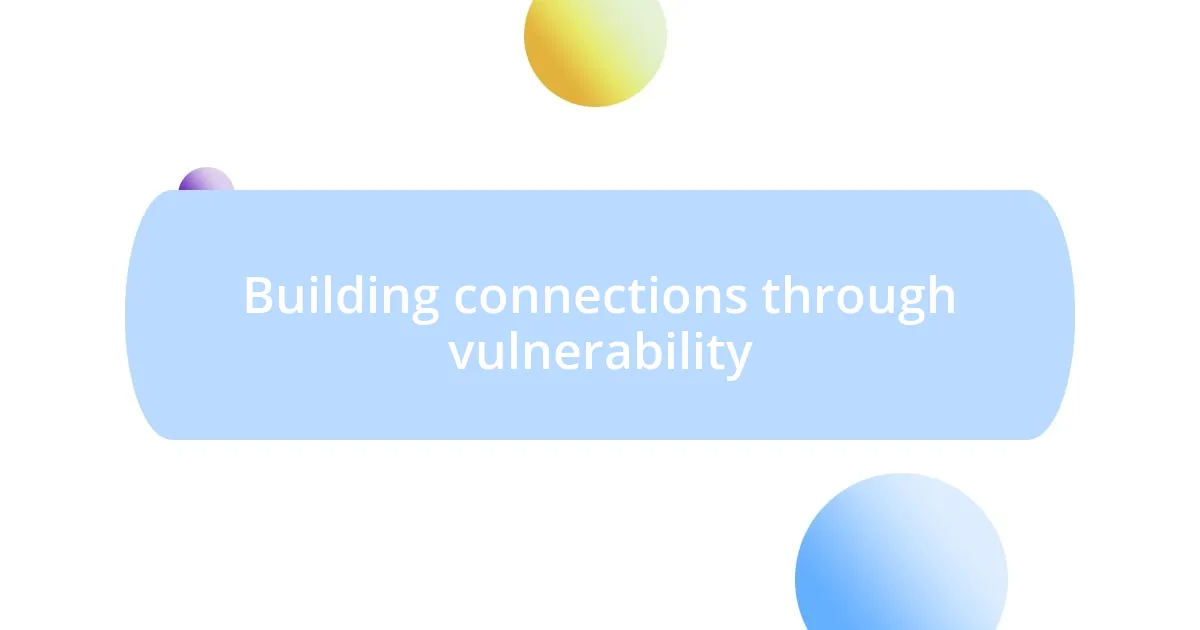
Building connections through vulnerability
When I think about connection, vulnerability feels like the secret ingredient. I remember a time during a casual dinner with friends when I opened up about struggling to find balance in my life. The room fell silent for a moment, and then everyone began to share their own challenges—moments of overwhelming stress, personal doubts, and the pressure to succeed. The air shifted; we weren’t just friends sharing a meal anymore. We transformed into a supportive circle where unguarded truths helped forge deeper relationships. Isn’t it amazing how one genuine admission can pave the way for authentic connections?
The beauty of vulnerability is its ripple effect. I had a friend who was always the life of the party, but one night, she started talking about her anxiety and the cracks behind her confident façade. It was like watching a dam break open, allowing everyone to share their insecurities. I realized then that by exposing our true selves, we normalize these feelings, making it easier for others to step forward. Have you ever noticed how a simple heartfelt truth can make others feel safe enough to share their own?
In my experience, vulnerability transcends surface-level conversations. Just last month, I attended a networking event where, instead of slick pitches, we were encouraged to share our biggest fears in our careers. It felt uncomfortable at first, but as I spoke about my fear of failure, a profound sense of authenticity filled the room. Others shared their own apprehensions, and it created bonds that were far stronger than typical small talk. Doesn’t this illustrate that vulnerability can change the very nature of our interactions, fostering deeper understanding and empathy?
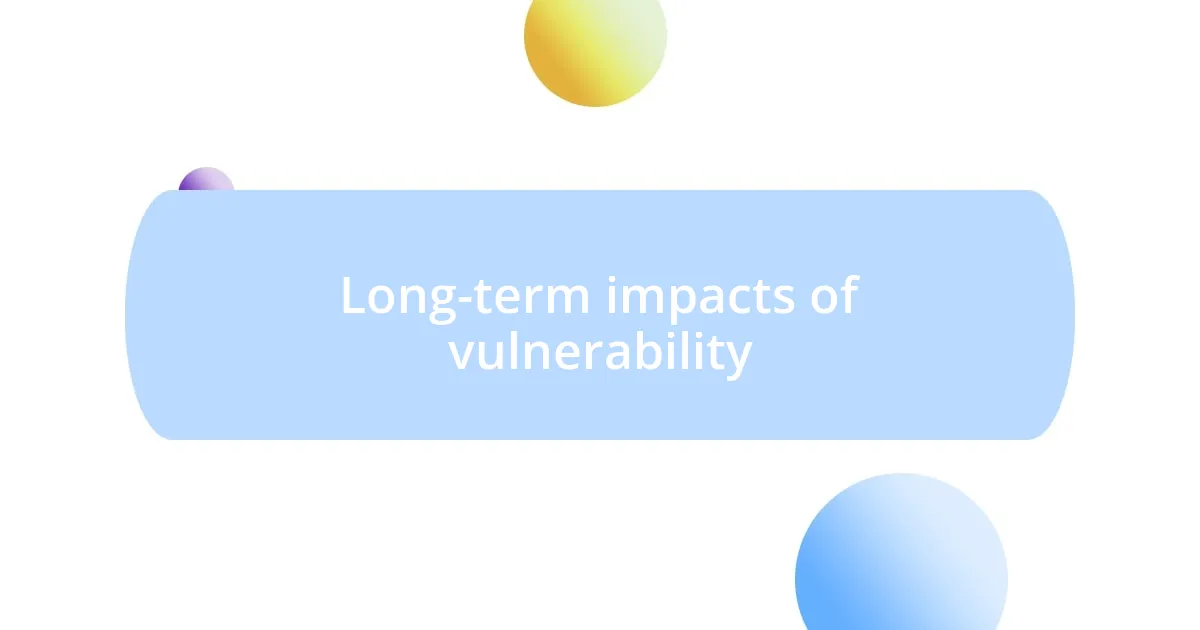
Long-term impacts of vulnerability
Embracing vulnerability has unexpected long-term impacts that can reshape our lives. A few years ago, I attended a workshop focusing on emotional intelligence, where I decided to share how my fear of failure often paralyzed me in pursuing new opportunities. That admission not only uplifted me but also encouraged others to share their fears openly. Over time, I’ve seen how these honest conversations have fostered a supportive community where we celebrate not just our successes, but also our struggles and growth.
In my experience, the long-term effects of vulnerability extend to personal resilience. I often think about how, after revealing my anxiety about job stability during a team meeting, I gained not just sympathy but a wealth of practical advice from colleagues who had faced similar issues. This exchange transformed our workplace culture, leading to a shared commitment to support one another. It’s fascinating to realize that by being vulnerable, we not only bolster our networks but also build a foundation of trust that can withstand challenges.
Over the years, I’ve noticed that embracing vulnerability also enhances emotional intelligence. Reflecting on moments where I’ve opened up about my insecurities, such as expressing my doubts in a leadership role, I’ve become more attuned to the feelings of others. The result? A more compassionate outlook toward both their struggles and my own. Have you ever found that vulnerability has changed the way you approach relationships? Each little act of courage builds a deeper understanding, creating a cycle of empathy that enriches our interactions over time.












